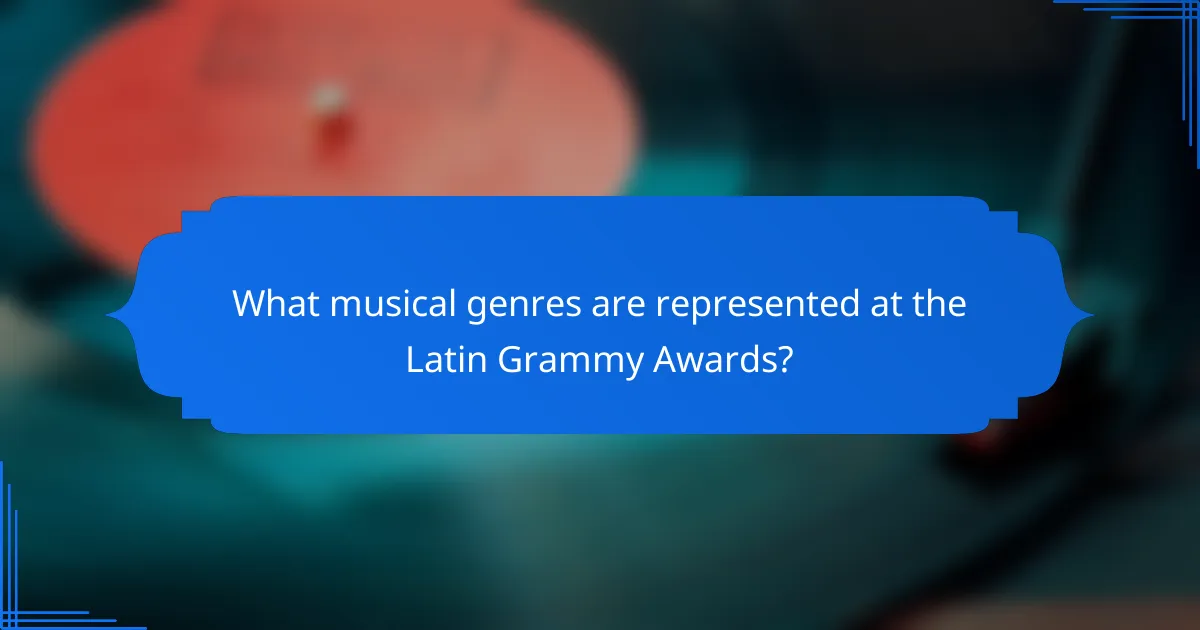The Latin Grammy Awards are an annual ceremony established in 2000 by the Latin Recording Academy to recognize excellence in the Latin music industry across various genres such as salsa, reggaeton, Latin pop, and more. This prestigious event honors artists, producers, and songwriters, while also promoting cultural heritage and diversity within the music community. The awards showcase live performances and provide a platform for emerging talent, highlighting the global influence of Latin music. Additionally, the Latin Grammy Awards feature specific categories for different musical genres, ensuring fair recognition of the diverse artistic expressions found within Latin music.

What are the Latin Grammy Awards?
The Latin Grammy Awards are an annual awards ceremony recognizing excellence in the Latin music industry. Established in 2000, they celebrate various genres including salsa, reggaeton, and Latin pop. The awards are presented by the Latin Recording Academy. They aim to honor artists, producers, and songwriters in the Latin music community. The ceremony features live performances and showcases diverse musical talent. The Latin Grammy Awards have become a significant cultural event in the music industry. They highlight the global influence of Latin music.
How did the Latin Grammy Awards originate?
The Latin Grammy Awards originated in 2000. They were established to recognize and honor excellence in the Latin music industry. The awards were created by the Latin Academy of Recording Arts & Sciences. This organization was formed to promote Latin music and its artists. The first ceremony took place in Los Angeles, California. It aimed to celebrate the diverse range of Latin music genres. Since then, the awards have grown in prestige and visibility. They now include categories for various musical styles and contributions.
What were the key milestones in the establishment of the Latin Grammy Awards?
The key milestones in the establishment of the Latin Grammy Awards include the announcement of the awards in 1997. The first Latin Grammy Awards ceremony took place in 2000. The Latin Recording Academy was founded to oversee the awards. The awards were created to recognize excellence in Latin music. The first broadcast of the ceremony occurred on September 13, 2000. The Latin Grammys gained recognition and credibility over the years. In 2005, the awards expanded to include more categories. The Latin Grammy Awards continue to celebrate diverse musical genres and artists.
Who were the founders and early supporters of the Latin Grammy Awards?
The Latin Grammy Awards were founded by the Latin Academy of Recording Arts & Sciences. This organization was established to recognize and celebrate Latin music. Early supporters included prominent figures in the music industry. Notable supporters were artists like Gloria Estefan and Carlos Santana. Their involvement helped legitimize the awards. The first ceremony took place in 2000. It aimed to honor excellence in Latin music. The awards have since grown in prestige and recognition.
What is the significance of the Latin Grammy Awards in the music industry?
The Latin Grammy Awards are significant in the music industry as they recognize and celebrate the artistic achievements of Latin music. They provide a platform for Latin artists to gain international recognition. Established in 2000, the awards highlight the diversity of Latin music genres. They also promote cultural appreciation and understanding through music. The Latin Grammy Awards have expanded the global reach of Latin music. They influence trends and encourage collaborations within the industry. The event showcases the talent and creativity of Latin artists. This recognition helps elevate the music’s status worldwide.
How do the Latin Grammy Awards influence Latin music globally?
The Latin Grammy Awards significantly influence Latin music globally by providing a prestigious platform for recognition. This recognition elevates the visibility of Latin artists in the international music scene. The awards celebrate diverse genres, showcasing the richness of Latin culture. They encourage collaboration among artists across different countries and styles. This fosters innovation and cross-pollination of musical ideas. The Latin Grammy Awards also attract media attention, amplifying the reach of Latin music. According to the Recording Academy, the awards have helped increase Latin music sales and streaming worldwide. This growth reflects the awards’ role in shaping global music trends.
What role do the Latin Grammy Awards play in promoting cultural diversity?
The Latin Grammy Awards play a significant role in promoting cultural diversity by celebrating Latin music and artists from various backgrounds. They provide a platform for artists representing diverse genres, such as salsa, reggaeton, and folk music. This recognition encourages the appreciation of different cultural expressions within the music industry. The awards also highlight the contributions of artists from various Latin American countries, fostering cross-cultural understanding. By honoring a wide range of musical styles, the Latin Grammy Awards help to elevate underrepresented voices in the global music scene. This inclusivity strengthens cultural ties among diverse communities. The awards have also led to increased visibility for Latin music internationally, showcasing its rich heritage and contemporary relevance.

What is the cultural impact of the Latin Grammy Awards?
The Latin Grammy Awards significantly influence Latin music and culture. They promote recognition of Latin artists worldwide. This awards ceremony elevates the visibility of diverse musical genres. It celebrates cultural heritage through music, fostering pride among Latin communities. The event also encourages collaboration between artists from different backgrounds. It serves as a platform for emerging artists to gain exposure. The Latin Grammy Awards have contributed to the globalization of Latin music. They highlight the importance of cultural diversity in the music industry.
How do the Latin Grammy Awards celebrate Latin culture?
The Latin Grammy Awards celebrate Latin culture by honoring the diversity and richness of Latin music. They recognize artists from various genres, including salsa, reggaeton, and folk music. The awards highlight contributions from different Latin American countries. This promotes cultural exchange and appreciation among audiences worldwide. The event showcases performances that reflect traditional and contemporary Latin music styles. Additionally, it provides a platform for emerging artists to gain recognition. The Latin Grammy Awards also emphasize the importance of cultural heritage in music. By celebrating these elements, they foster a sense of pride in Latin identity and creativity.
In what ways do the awards recognize and honor cultural heritage?
The Latin Grammy Awards recognize and honor cultural heritage through the celebration of diverse musical genres. They highlight the contributions of artists from various Latin American backgrounds. The awards promote cultural awareness by showcasing traditional music styles. They also acknowledge the historical significance of these genres in shaping cultural identities. Additionally, the awards provide a platform for underrepresented voices in the music industry. By honoring artists who incorporate cultural themes in their work, the Latin Grammy Awards reinforce the importance of heritage. This recognition fosters appreciation for the richness of Latin culture globally.
How do the Latin Grammy Awards foster community among Latin artists?
The Latin Grammy Awards foster community among Latin artists through recognition and celebration of their work. These awards provide a platform for Latin artists to showcase their talent to a global audience. By honoring diverse musical genres, the Latin Grammy Awards promote collaboration among artists. This event encourages networking and partnerships within the Latin music industry. The awards also highlight cultural heritage, uniting artists from various backgrounds. Additionally, the Latin Grammy Foundation supports educational initiatives for aspiring musicians. Such efforts create a sense of belonging and solidarity among artists. Overall, the Latin Grammy Awards strengthen the Latin music community by fostering connections and celebrating shared achievements.
What are the notable winners of the Latin Grammy Awards?
Notable winners of the Latin Grammy Awards include Juanes, Shakira, and Alejandro Sanz. Juanes has won 26 awards, making him one of the most awarded artists. Shakira has received 3 Latin Grammy Awards and is a global icon. Alejandro Sanz has won 4 Latin Grammys, showcasing his significant impact on Latin music. Other notable winners include Calle 13 and Rosalía, both recognized for their innovative contributions. Calle 13 has won 20 Latin Grammys, reflecting their genre-blending style. Rosalía has gained acclaim for her modern take on flamenco music, winning multiple awards. These artists represent the diversity and richness of Latin music.
Who are some of the most awarded artists in Latin Grammy history?
Some of the most awarded artists in Latin Grammy history include Juanes, who has won 26 awards. Another notable artist is Alejandro Sanz, with 24 Latin Grammys to his name. Shakira follows closely, having received 13 awards. Additionally, Caifanes has earned 10 Latin Grammys. These artists have consistently demonstrated exceptional talent and influence in the Latin music industry. Their numerous awards reflect their contributions and popularity in the genre.
What achievements have these artists made in the Latin music scene?
These artists have made significant achievements in the Latin music scene. They have won multiple Latin Grammy Awards, showcasing their excellence. For instance, artists like Juanes and Shakira have received numerous awards for their contributions. Their music has topped charts across Latin America and beyond. Collaborations with international artists have expanded their reach. They have influenced various genres, including reggaeton and Latin pop. Many have also engaged in philanthropic efforts, supporting cultural initiatives. Their performances at major events have further elevated their status in the industry. These achievements highlight their impact and legacy in Latin music.

What musical genres are represented at the Latin Grammy Awards?
The Latin Grammy Awards represent various musical genres. These include Latin pop, reggaeton, salsa, bachata, and regional Mexican music. Additionally, genres like Latin rock, flamenco, and tropical music are also recognized. The awards celebrate the diversity of Latin music. Each genre showcases unique cultural influences and artistic expressions. The representation reflects the broad spectrum of Latin music’s evolution. The Latin Grammy Awards have categories specifically for each genre, ensuring fair recognition.
Which genres have the most nominations and wins at the Latin Grammy Awards?
The genres with the most nominations and wins at the Latin Grammy Awards are Latin Pop and Regional Mexican. Latin Pop has consistently dominated the nominations and wins categories. Regional Mexican music has also seen significant recognition at the awards. Historical data shows that Latin Pop artists frequently receive multiple nominations each year. Regional Mexican music has produced numerous winners in key categories. This trend highlights the popularity and influence of these genres within the Latin music industry.
How do different genres reflect the diversity of Latin music?
Different genres reflect the diversity of Latin music through their unique rhythms, instruments, and cultural influences. Genres like salsa, merengue, and bachata showcase Caribbean roots and vibrant dance elements. In contrast, genres such as tango and folkloric music highlight regional traditions and storytelling. Reggaeton blends Latin rhythms with hip-hop, illustrating modern cultural fusion. Each genre represents specific historical and social contexts, contributing to the rich tapestry of Latin music. The Latin Grammy Awards celebrate this diversity by recognizing various genres and their contributions to the global music scene.
What emerging genres are gaining recognition at the Latin Grammy Awards?
Emerging genres gaining recognition at the Latin Grammy Awards include urban music and trap. Urban music encompasses various styles blending hip-hop, reggaeton, and Latin rhythms. Trap, a subgenre of urban music, has seen significant growth in popularity among younger audiences. The Latin Grammy Awards have started to include categories specifically for these genres. This reflects the evolving landscape of Latin music. The rise of streaming platforms has also contributed to the visibility of these genres. Artists like Bad Bunny and J Balvin have brought urban music to mainstream attention. Their success has paved the way for more artists in this space.
How do the Latin Grammy Awards adapt to changing musical trends?
The Latin Grammy Awards adapt to changing musical trends by incorporating diverse genres and recognizing emerging artists. They regularly update award categories to reflect current musical styles. For example, they introduced categories for urban music as its popularity grew. The awards also feature performances that showcase trending genres and collaborations between established and new artists. This approach keeps the ceremony relevant to contemporary audiences. Additionally, the Latin Recording Academy conducts research on music trends to inform their decisions. This adaptability ensures the Latin Grammy Awards remain a vital part of the music industry.
What new categories have been introduced in recent years?
Recent years have seen the introduction of new categories at the Latin Grammy Awards. These include Best Música Urbana Album and Best Pop/Contemporary Album. Additionally, the awards introduced Best Reggaeton Performance and Best Latin Pop Song. These categories reflect the evolving musical landscape and the growing popularity of various genres. The changes aim to recognize diverse musical contributions and enhance representation. The introduction of these categories has been noted since the 2010s, aligning with trends in Latin music.
How do the awards reflect the evolution of Latin music styles?
The Latin Grammy Awards reflect the evolution of Latin music styles by recognizing diverse genres and innovative artists. Since their inception in 2000, the awards have showcased a wide range of musical forms. This includes traditional genres like salsa and mariachi, alongside contemporary styles such as reggaeton and Latin pop.
The inclusion of new categories over the years demonstrates the changing landscape of Latin music. For instance, the introduction of the Best Urban Music Album category in 2018 highlighted the rise of urban Latin music.
Winners often represent a blend of cultural influences, showcasing the globalization of Latin music. Notable artists like Bad Bunny and J Balvin have brought reggaeton to mainstream audiences, reflecting shifting tastes.
The awards also highlight collaborations across genres, illustrating the fusion of Latin music with pop, rock, and hip-hop. This evolution is evident in the nominations and wins of artists who push musical boundaries.
Overall, the Latin Grammy Awards serve as a mirror to the dynamic and evolving nature of Latin music styles.
What can artists learn from the Latin Grammy Awards?
Artists can learn the importance of cultural representation from the Latin Grammy Awards. The awards celebrate diverse musical genres and artists from Latin America. This highlights the significance of embracing cultural heritage in artistic expression. Additionally, artists can observe the impact of collaboration across genres. Many winners feature cross-genre collaborations, showcasing creativity and broader audience appeal. The awards also emphasize the value of innovation in music. Artists are encouraged to experiment with new sounds and styles to stand out. Furthermore, the Latin Grammy Awards demonstrate the power of community support. Artists often gain recognition through fan engagement and industry connections. Ultimately, these lessons can guide artists in their creative journeys and career development.
The Latin Grammy Awards are an annual ceremony established in 2000 to recognize excellence in the Latin music industry across various genres, including salsa, reggaeton, and Latin pop. The awards celebrate the contributions of artists, producers, and songwriters, highlighting the cultural significance and global impact of Latin music. Key milestones in the awards’ history include the founding of the Latin Academy of Recording Arts & Sciences and the introduction of new categories to reflect evolving musical trends. Notable winners, such as Juanes, Shakira, and Alejandro Sanz, exemplify the diversity and richness of Latin music, while the awards promote cultural appreciation and community among Latin artists.
